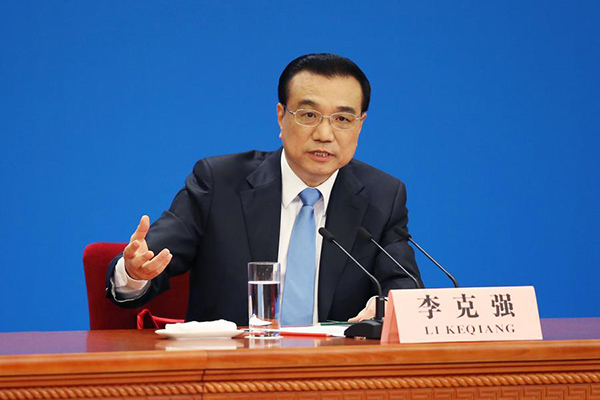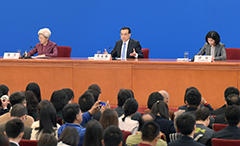Highlights of Premier Li's news conference
2017-03-15
chinadaily.com.cn
Premier Li Keqiang met reporters from home and abroad at a news conference on March 15 at the end of the annual meeting of the National People's Congress. Premier Li answered questions on various topics such as the economy, financial reforms and diplomacy. Here are highlights of the event.
China-US relations
The One-China policy constitutes the political foundation of China-US relations which has remained unshaken despite the changing circumstances, nor can this relationship be undermined. "With that foundation in place, we believe that there are broad prospects for China-US cooperation."
Diplomats from the two countries are already engaged in discussing a face-to-face meeting between the Chinese and US presidents.
Financial risks
There will not be an eruption of systematic financial crisis in China and it has many policy tools at its disposal to resolve financial risks, Premier Li said.
"Once we find financial risks, we will tackle them promptly to prevent it from worsening," he said.
He also said China's GDP growth target for this year, which is "around 6.5 percent", is not low given China's already big economic scale and would not necessarily be easy for China to achieve.
China will remain an important contributor of global economic growth this year, he told reporters after closure of the annual legislative session.
China contributed about 30 percent to global growth in 2016.
Economic growth
There is little risk of a hard landing for the Chinese economy, because the country's healthy economic transformation process relies mainly on industrial upgrades.
China has, for years, achieved medium-to-high growth, thanks to achievements made in consumption and industrial upgrades.
China will not adopt mass stimulus measures but will continue to fuel growth momentum through deepening reform.
Regional trade agreements
China always takes an open attitude to various regional trade agreements, and the country will seize any possible opportunity to improve the world economy through multilateral trading system.
But China will not overreach its regional influence to seek trade arrangements where the country's due role is not in place.
Streamlining administration and delegating power
China will continue to lower market thresholds and create an environment of fair competition.
"We have the resilience to (push forward the streamlining) no matter what kind of problems or resistance we encounter."
Governments at all levels should integrate administrative services with the internet to make life easier for the public as well as encourage “law-abiding market entities” and give a green light to entrepreneurs and innovators.
Korean Peninsula issue
China doesn't want to see "chaos at its doorstep".
China, a resolute champion of the international non-proliferation system, has been implementing related UN resolutions comprehensively and strictly, and has been sticking to solving the peninsula issue through talks and achieving the denuclearization of the peninsula.
Tensions on the peninsula have the potential to spark conflict and harm all parties involved.
Employment
The Chinese government will not allow massive unemployment, and China's economy is projected to see steady growth without the likelihood of a hard landing.
“A close look at the Government Work Report will show that we have set higher targets in 2017 for all major areas of economic and social development, which includes creating 1 million more urban jobs than in 2016.”
“Employment is of paramount significance for such a large country as China, which has more than 1.3 billion people. Employment is the foundation of economic development.”
For the past four years, China has been creating 13 million urban jobs a year, which has helped the country keep unemployment at a fairly low level.
Made in China 2025
Made in China 2025 is to enhance the quality of products, better meet consumers' demands, and constitutes an important part of the supply-side structural reform.
But the plan will never lead to reducing imports and retreating from further opening-up.
Mass entrepreneurship and innovation
China's 800 million-strong labor force, among whom 170 million received higher education and training in professional skills, is a tremendous source to generate enormous market opportunities for both China and the world.
The government should create a good environment to promote business startups and innovation and for Chinese people to make the best of their intelligence.
Mass entrepreneurship and innovation has not only brought many job opportunities, but also created many modes of business, including the sharing economy and Internet Plus.
Mainland-HK bond market trading link
A bond market trading link will be set up between the Chinese mainland and Hong Kong this year to further open the country's securities market.
The bond market link will allow overseas investors to buy and trade bonds in the Chinese mainland market while offering mainland investors access to the bond market in Hong Kong.
The central government will step up the effort to support the Hong Kong economy and will issue more policies to promote cooperation between the Chinese mainland and Hong Kong.
China-Russia trade relations
China-Russia trade relations have turned the corner and achieved strong growth. The outcome should be attributed to the joint efforts from both sides.
Two-way trade recorded a big surge in the first two months this year, showing there is still tremendous untapped potential in China-Russia economic and trade ties and the two economies are highly complementary.
"I have confidence that the goals we set for our two-way trade can be achieved."
Exchange rate
China has ample foreign exchange reserves to satisfy the demands of imports and short-term debt repayments.
China does not want to resort to yuan depreciation to boost exports as that would dampen the restructuring and upgrading of the corporate sector.
"We also do not want any trade war with others and we have stuck to reform of the yuan's exchange rate formation mechanism to keep it basically stable at reasonable and equilibrium levels."
Laid-off workers
Helping laid-off workers find new jobs is the most important issue for China as it works to reduce industrial overcapacity.
Last year, the central government set up a 100 billion yuan ($14.4 billion) fund to help workers and also asked local governments to set up similar funds. Assistance has already been provided to 720,000 laid-off workers.
Efforts to cut overcapacity will be extended this year to coal-fired power generation. Together with the people who are still to be re-employed from 2016, China will need to help about 1 million workers this year.
The key is to continue generating jobs. Thanks to the initiative of massive entrepreneurship and innovation, many jobs have been created, while traditional drivers of growth have been upgraded, which is also generating job opportunities.
Land use
The State Council has asked related departments to come up with proposals about laws on the protection of real estate.
When the 70-year term of land use for residential buildings ends, owners can renew the lease without applying, and no preset conditions are set, and it will not affect any transactions of the property.
Asia-Pacific region
Premier Li hopes cooperation between China and the United States in the Asia-Pacific region will bring opportunities to ASEAN countries, instead of trouble.
China does not want to see any party in the Asia-Pacific region feel compelled to choose sides under the influence of a Cold-War mentality.
The Asia-Pacific is the common home of all countries in the region, and China believes regional affairs should be decided and handled on the merits of each case.
Tax & fees
China will continue to reduce the tax burden and cut fees on companies this year as part of efforts to help improve their competitiveness.
"The central government is required to take the lead in reducing government expenses in order to leave room for cutting costs of enterprises."
Costs of broadband access, electricity and logistics will be further reduced.
Mainland-Taiwan
The mainland will continue to adhere to the 1992 Consensus as the political foundation to oppose Taiwan independence resolutely and uphold peace across the Taiwan Straits.
"Our policy towards Taiwan has been consistent and clear-cut, that is we will continue to adhere to the 1992 Consensus, which embodies one-China principle, as the political foundation, oppose resolutely Taiwan independence, uphold peace across Taiwan Straits, uphold peaceful development of cross-Straits relations, and safeguard the well-being of people on both sides."
The peaceful development in cross-Straits relations has brought and will continue to bring new opportunities for compatriots in Taiwan.
China-Europe
A bilateral investment treaty between China and EU will help further open up trade.
China will continue to open its market to European businesses, and European-invested companies registered in China will get the same treatment as Chinese companies.
Air pollution
A new special fund will bring together top scientists to tackle smog. "Blue skies will not be, and should not be, a luxury."
China will take firm steps to address coal consumption, vehicle exhaust emissions and dust.


